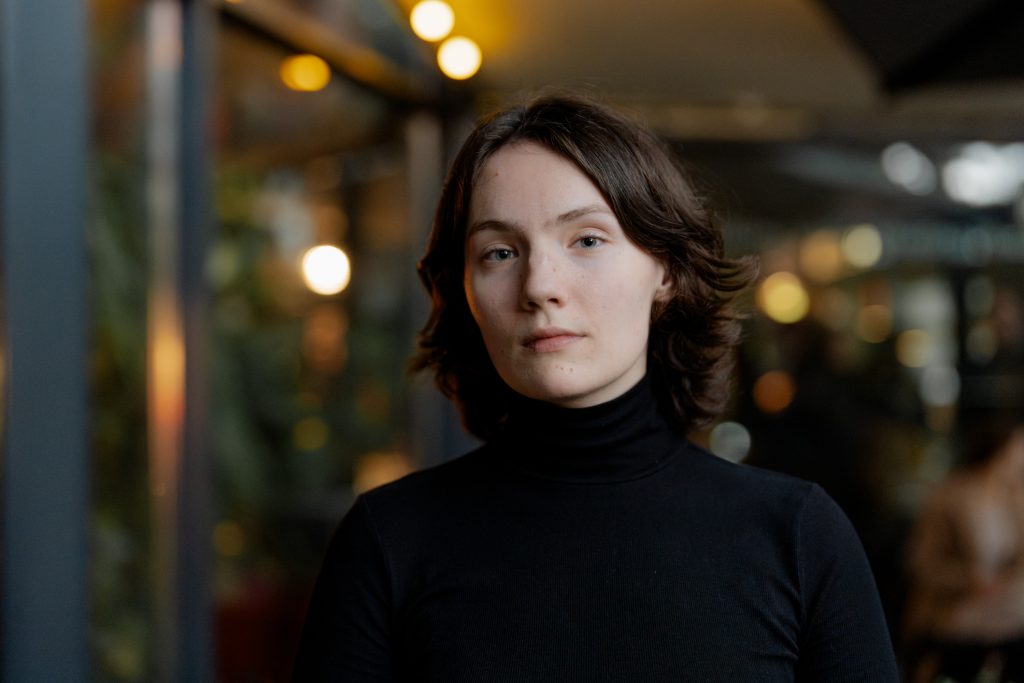Born in Minsk, Belarus, she obtained her specialist degree in literary writing at the Maxim Gorky Literature Institute (Moscow, Russia). Apart from her academic work, she writes prose, poetry and critical essays on contemporary literature and art.
Hanna Horn

University of Greifswald
IRTG Baltic Peripeties
Anklamer Str. 20
17489 Greifswald
Germany
Room: 0.12
+49 3834 420 3587
hanna.horn[at]uni-greifswald.de
ORCiD: https://orcid.org/0000-0003-0948-6070
Versions of home. Narrative analysis of Platformised Belarusian migration life writing
Emigration from Belarus, which has intensified since 2020-21, has its history dating back to the 19th and 20th centuries. Interested in multimediality of today’s writing, and reading it against the backdrop of the re-sovietization of official Minsk and the state’s use of internet technologies to suppress civil society, I’m taking a closer look at Belarusian authors living and working in exile and the ways they narrate their experiences of home and (non-)belonging online.
MORE ABOUT THE PROJECTArticles and book chapters
- “Mediale Zwischenwelt. LiveJournal als Refugium für belarussische Stimmen,” Osteuropa 1-3 (2025): 459-462, https://zeitschrift-osteuropa.de/hefte/2025/1-3/mediale-zwischenwelt/.
Other
- “Passive security system at work. Visit to the Lubmin Nuclear Power Plant,” [blog] Baltic Peripeties Blog, October 14, 2024, https://peripeties.uni-greifswald.de/visit-lubmin-npp/.
- “Object-Oriented Narrativisations of Self in Digital Life Writing From Belarus: On Examples of Tatsiana Zamirovskaya and Valzhyna Mort”, international conference Digital Exile Literature, Berlin-Brandenburgische Akademie der Wissenschaften, October 7-8, 2025.
- “Multilinguality as version of home, in Belarusian digital life writing from migration. On examples of Tatsiana Zamirovskaya and Valzhyna Mort”, International Congress of Belarusian Studies, Humboldt-Universität zu Berlin, September 25-27, 2025.
- “Versions of Home. Narrative Analysis of Platformised Object-Oriented Life Writing of Belarusian Exile”, 20th Young Forum of Slavic Literary Studies (JFSL), Institute for Slavic Studies, University of Giessen, September 10-12, 2025.
- “Object-oriented narrativizations of self in digital life writing from Belarus. On examples of Tatsiana Zamirovskaya and Valzhyna Mort“, summer school Re-writing the Empire: Eastern European Postimperial Memories in Transregional Perspective, Moise Palace Cres, Croatia, July 19-24, 2025.
- “Versions of home. Narrative analysis of platformised object-oriented life writing”, PhD seminar, Narrative, Culture, and Cognition research group, University of Tartu, June 5, 2025 [online].
- “Object-Oriented Life Writing Across Social Media Platforms”, guest lecture for BA-students at the University of Oslo, Faculty of Humanities, Department of Linguistics and Scandinavian Studies, May 6, 2025.
- “I’m from Her/e: Reading Home through Evocative Objects in Tatsiana Zamirovskaya’s Digital Life Writing”, Interdisciplinary Conference Versions of Home. Adapting — Rewriting — Referencing in the Arts, University of Graz, March 26-28, 2025.
- “Distributed agency in digital life writing from Belarus . On example of Tatsiana Zamirovskaya”, 2. Grazer Winterkolleg für Sprache, Kultur und Gesellschaft Belarus digital, University of Graz, March 3-7, 2025.
- “Narrating the Migrant Self in Digital Life Writing: On the Example of Tatsiana Zamirovskaya’s Digital Life Writing,” interdisciplinary autumn seminar for PhD researchers Narrare, Tampere University [online], November 8, 2024.
- “Close Reading of Evocative Objects in the Inter-imperial Space of Digital Life Writing. On the Example of Tatsiana Zamirovskaya’s Digital Life Writing,” fünfte interdisziplinäre Jahrestagung des Forschungsschwerpunktes digitale Kultur Tausend Plattformen: Plattformforschung nach dem Digital Services Act, FernUniversität in Hagen, Berlin Campus, November 7-8, 2024.
- “Emigration as Death-like Experience: On the Example of Tatsiana Zamirovskaya’s Digital Life Writing,” the 7th international death online research symposium Digital Death – Transforming History, Rituals, and Afterlife, University of Helsinki [online], October 3-5, 2024.
- “Life Writing ByNet: (Auto-)biographical Motives in Digital Dictatorship,” colloquium of FSP digitale_kultur digitales_kolloquium 1, FernUniversität in Hagen, Leipzig Campus, September 30 – October 1, 2024.
- Participation in the CBEES Summer School The Return of History: Memory, War and the End of the “Post”, organised by the Centre for Baltic and East European Studies (CBEES) at Södertörn University, Sigtuna, August 12-17, 2024.
- “Post-revolutionary Hope. On the Example of Facebook Prose by Tatsiana Zamirovskaya,” workshop Autobiography, Digitality & Platformisation, FernUniversität in Hagen, Berlin Campus, May 30-31, 2024.
- “Life Writing ByNet: (Auto-)biographical Motives in Digital Dictatorship,” international workshop Resonant Conflicts. Turning Points in the Baltic Sea Region, organised by the IRTG Baltic Peripeties. Narratives of Reformations, Revolutions and Catastrophes, Department for Language and Literature, NTNU Trondheim, May 22-24, 2024.
- “The Motifs of Emigration and Nostalgia in Facebook Prose by Tatsiana Zamirouskaya,” Graduate Student Conference in Russian Language and
Literatures (Helsinki — Tallinn — Tartu), University of Tartu, May 10-12, 2024. - “The Motifs of Emigration and Nostalgia in Facebook Prose by Tatsiana Zamirouskaya,” 9th Annual ‘Belarusian Studies in the 21st Century’ Conference, UCL School of Slavonic and East European Studies, Ostrogorski Centre, Francis Skaryna Belarusian Library and Museum, University College London [online], April 26-27, 2024.
- Pecha-Kucha Night with young researchers, ZOiS Annual Conference Paradigms in Times of War: Unpacking Research and Policy Challenges, Zentrum für Osteuropa- und internationale Studien (ZOiS), Berlin, November 16-17, 2023.
- Workshop A Short History of Digital Publics at War, FernUniversität in Hagen, Berlin Campus, May 2-3, 2023.
University studies and degrees
- Since April 2024
- Doctoral Researcher at the International Research Training Group “Baltic Peripeties. Narratives of Reformations, Revolutions and Catastrophes” at the University of Greifswald.
- Since January 2024
- Visiting researcher at FernUniversität Hagen, Faculty of Cultural and Social Sciences, Public History.
- 2017 – 2022
- Specialist degree in Literary Writing, The Maxim Gorky Literature Institute.